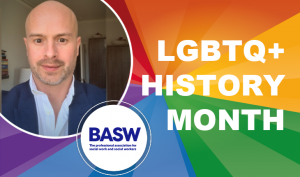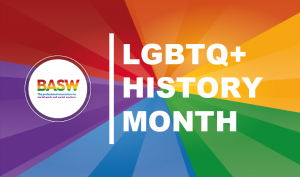BASW blog: 'LGBTQ+ people are not deviants'

The following blog includes disclosure of sexual assault, grooming and rape. Support for sexual assault can be found on the NHS website: Help after rape and sexual assault. This resource can also direct you to local services.
By Dr. Paul Shuttleworth, BASW England Professional Officer
I am a queer man and do not label myself as a gay man. This should not be a controversial statement to make. It shouldn’t even be a statement I need to make. However, it often evokes feelings for both heterosexual and LGBTQ+ communities.
I grew up in a time when the right to be gay in England could only happen when a person was 21. Originally the 21-age limit was said to have protected men who had sex with men. Women at that time didn’t need protection because it was thought they wouldn’t engage in such same-sex shenanigans - and if they did, they’d be much nicer about it.
The 21-age limit law and the need to protect suggested two things: homosexuality is deviant behaviour, not to be promoted; and homosexuals are either predators or victims.
As a teenager who experienced sexual assault, I can categorically say that this thinking and legislation did not protect me. In fact, it enhanced my shame and probably made me more vulnerable.
I felt shame that I had been forced to engage in such 'deviant' behaviour. At the time I felt shame because I thought my same-sex attraction may have encouraged being groomed and raped.
I also felt shame because I felt that if I had reported the rapes, I would have been outed as the disgusting deviant that others made me out to be. I’d have to admit to being gay. Just think of the meaning of the word ‘admit’.
If anything, the legislation and the thinking of that time hindered my perpetrator from being reported and stopped. It also drove homosexuality underground with no safeguards. I was hidden from those adults, such as social workers, who should have been looking out for me.
These ideas of othering, difference, deviance, and shame can be found at the crux of most anti-oppressive social work literature. All marginalised groups that are ostracised, subjugated, violated, and discriminated against often feel shame because others and society see them as different.
We may now feel we are part of a more understanding and open society. However, assaults on LGBTQ+ people still happen. The latest statistics show that, on average, there were 2,221 LGBTQ+ hate crimes reported per month in the UK in 2021.
We must also remember that it is still illegal to be LGBTQ+ in many countries, which can legitimise discrimination, imprisonment, violence, and murder. Horrific things still happen because LGBTQ+ people are not seen as normal.
'Being queer gives me scope to be who I want, without confining myself to a box'
In my 20s, I started to come to terms with being told I was different to heterosexuals. I would go on marches insisting I was as valid as any normal person—pride for my difference, not shame.
Then, when I was undertaking my MA in social work, I started looking into queer theory. I know that many of my LGBTQ+ peers don’t like the term queer. It has often been used as a slur before an assault, often a violent one. Some gay men and lesbians feel that it dilutes their identity. This is an identity for which they are proud and have fought hard to obtain equal rights. If people don’t want to use the word, they shouldn’t.
However, for me, being queer allows me to think of myself as normal rather than deviant. It gives me scope to be who I want, without confining myself to a box.
For me, being queer suggests several things. First, sexuality is on a spectrum. The Kinsey Scale is often referred to. Therefore, you can be queer but only engage in heterosexual sexual activity, or same-sex sexual activity, or both, or neither. Your sexual practices, thoughts and relationships do not define you. In a sense, we are all queer.
Second, if everyone is on a spectrum in terms of their relationships, sexual attractions, sexual actions, romantic relationships and fantasies - then one does not have to lead to another. They can be linked but also separate. Indeed, these relationships and thoughts about attraction may change over the life course.
Third, I do not have to be labelled as one thing or another. This still happens today and is the source of stereotypes and generalisations. For example, I’m not exceptionally stylish, I prefer soul music and hip hop to Kylie, I’m not always fun or funny at parties, and I know nothing about interior design. I’m also not more likely to be feminine just because of my sexuality. I know many camp men and women who are in heterosexual relationships. Most importantly, I’m not more likely to be a paedophile or a sexual predator.
Fourth, queer theory grasps true intersectionality. It acknowledges the profoundly negative impact of homonormativity – that young white, affluent, gay men are the most influential people in the LGBTQ+ communities.
'I feel liberated, no longer a deviant, and no longer ashamed of my feelings'
I advocate for people to learn about queer theory - regardless of how you're labelled by others, or even yourself.
Queer theory celebrates diversity rather than difference. I feel liberated, no longer a deviant, and no longer ashamed of my feelings. It places the person rather than the label at the centre of our interactions. It can stop you from 'othering' other people.
Hopefully, it also helps us be the anti-oppressive, reflexive social worker we constantly strive to be.
If we want to accept LGBTQ+ people truly, we should all be accepted as part of the same diverse human race; not as different and certainly not as deviant.
